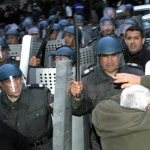Ian Brown
guardian.co.uk, Tuesday 13 November 2012 13.00 EST
Freedom of expression has been at the top of the agenda this week in Baku at the internet governance forum (IGF), an annual United Nations “multi-stakeholder” meeting.  The IGF has previously been held in less democratic states, such as pre-Arab-spring Egypt, and was set up by the UN world summit on the information society, held in Tunisia (and Geneva). But the Azerbaijan government has been particularly vicious in its attacks on journalists and bloggers.
The IGF has previously been held in less democratic states, such as pre-Arab-spring Egypt, and was set up by the UN world summit on the information society, held in Tunisia (and Geneva). But the Azerbaijan government has been particularly vicious in its attacks on journalists and bloggers.
Eynulla Fatullayev, the editor of the Azerbaijan Daily, was jailed in 2007 for criticising the government – after suffering beatings and the kidnapping of his father. Fatullayev recently won Unesco’s 2012 world press freedom prize. In 2011, the government threatened activist Elnur Majidli with 12 years in jail for “inciting hatred” (for calling for public protests via Facebook).
Human rights activist and blogger Emin Milli, previously attacked and jailed for “hooliganism”, has written a widely publicised letter this week to President Ilham Aliyev, warning that “the internet is not free in Azerbaijan and it is definitely not free from fear”. The visiting European commissioner, Neelie Kroes, gave a powerful speech stating “these repressive restrictions on media freedom, of whatever kind, are unacceptable … Members of the Council of Europe, including Azerbaijan, should follow the standards they have committed to. I want to pass this message to the president of Azerbaijan.”
Supporters of Azerbaijan’s hosting of the Eurovision song contest this year claimed it would shine a spotlight on the regime’s human rights abuses. Unfortunately, this did not seem to happen to any significant extent. Will the presence of government officials, senior internet industry figures, and civil society campaigners in Baku this week do a better job of improving human rights?
The EU’s aid and investment to the country might be a more concrete way for the European commission and member states to put further pressure on Aliyev’s regime. Perhaps the UN should make sure 2012 is the last year that an event with such significance for freedom of expression is held in a country that has such a questionable commitment to this fundamental right.
